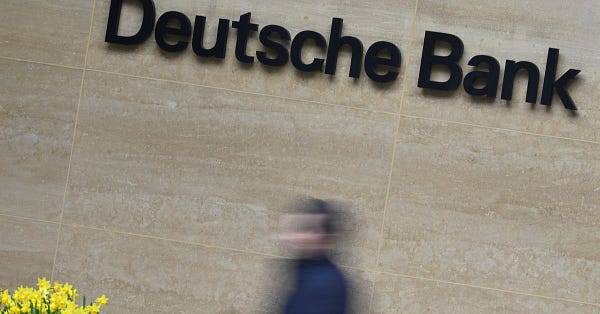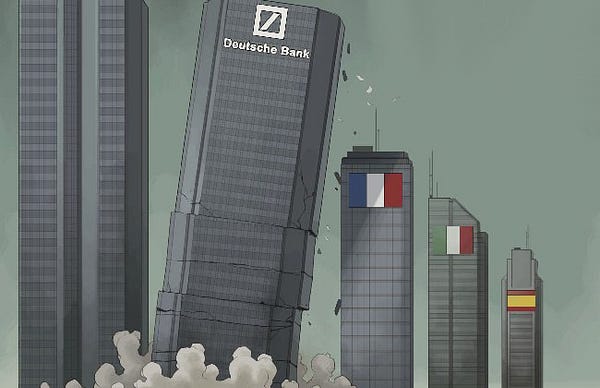Below, I’m going to insert a transcript/summary of Tom Luongo talking with the guys at The Duran. I’m still catching up on things, but I thought that putting the first twenty minutes of an hour and a half Youtube in writing would really help readers—allowing them to pause, rewind, ponder, etc. First some preliminaries from the news today that will make sense in light of what Luongo was saying a few days ago.
First, from Zerohedge:
Yellen Convenes Emergency Financial Stability Meeting On Friday As Banking Crisis Explodes
Here comes the panic.
Bloomberg just reported that Treasury Secretary Janet Yellen - who was singlehandedly responsible for stoking and restarting the bank crisis on Wednesday which until that day was easing back, with her comments that nobody in charge was even talking about a uniform deposit insurance, let alone working on one - will convene the heads of top US financial regulators Friday morning for a previously unscheduled meeting of the Financial Stability Oversight Council.
Mistake, incompetence, or malice? Ask Tom Luongo:
Yellen is doing what she was put at Treasury to do, create a panic, undermine the Fed's move to end the [Fed] Put and hand the western banking system to her Davos paymasters.
I said it two years ago, prepare for President Yellen.
She is the ONE CREATING THE PANIC to distract from the real implosions happening in europe. #DeutscheBank
Alex Mercouris starts it off by asking two questions:
Is this banking crisis serious? and
Where is the weakness--in Europe or in the US?
Luongo:
It's not so much one or the other, it's the question of relative vulnerability.
The great game of global capital is that capital flows to where it's treated best. We have a great global divide. The Eurasian bloc is trying to get out from under King Dollar hegemony. That is putting pressure on the collective West, which wants to extend that hegemony.
The question then becomes: Do we have grownups on the Western side of the divide who recognize the changed reality of world economics (and thus of monetary systems) and are willing to come to terms with it? TL thinks those grownups are in the Fed and the NY money center banks--they can see the problem. If they didn't see the problem they would have backed staying at the zero bound, pumping up the shadow banking system to infinity, and keep the party going.
The other faction in the West is the Davos group in Europe, who absolutely want to unmoore money from all opportunity costs to create new monetary units, i.e., Central Bank Digital Currencies--digital scrip--that can be used to maintain all economic activity under centralized technocratic control. So the West is divided.
Once you identify that divide, it's relatively simple to watch responses to it. The pressure from Eurasia, rapidly moving toward integrated trade on a multi currency basis, is that they're also building gold into the foundation, to keep everyone honest. This is why the Fed is acting the way it is, and why the NY banks are saying, in effect: We don't have any other option except to back off and retrench, because if we don't ... Eurasia will tie everything to gold, they'll sell our treasuries, and they'll collapse our banking system. And there's nothing we can do about it. They can survive a disorderly unwind, we cannot. Why? Because they have an energy surplus and a commodity surplus, and the gold is flowing from West to East. In the big picture, that's what this is about.
The collective West’s response is to launch a war on Russia and threaten war with China.
Now, looking at the three big areas of the world, who has the weakest hand? Clearly Europe. Europe will fight, tooth and nail, but at the end of the day Eurasia and the US hold most of the cards. The Fed is able to print more dollars but only allow them to circulate domestically, which will shore up the US banking system relative to Europe.
This doesn't mean that the US will skate and Europe will get trashed. It's all a big poop sandwich. We all have to take a bite, the question is: Who has to take the biggest bite?
On to Credit Suisse. This is the most misunderstood part of the whole thing. It's necessary to understand that Europe doesn't really have anything like the FDIC. That means the US can use the FDIC as a weapon against Europe. In the same way Europe doesn't have a singular bond market, which is why the Euro is a fundamentally weaker currency than the dollar. This means that there can't be an integrated policy response to a depositor bank run in Europe.
In the US what's happening is different than in the past. There is an implicit guarantee that all insurable deposits--those that already qualify for FDIC insurance--will be backstopped to infinity. And, by the terms of the Bank Term Funding Program, if the FDIC runs out of money they will tax the big banks to cover the shortfall. That's the exact opposite of what happened in 2008, when the regional banks got crushed. We have the big banks pledging future earnings to make sure payrolls are met at small and medium businesses--those are the entities that are at most risk.
The Fed wants to get back to a healthy regional banking system in the US, and the only way to do that is to unwind all the shadow banking institutions that we had operating in the US. SVB was the biggest. Blackrock is the biggest shadow banking outfit in the world--they're not a bank, but they act like one.
So why is the Credit Suisse (CS) merger with Union Bank Switzerland (UBS) so interesting? Why are the Europeans screaming so hard? The Fed was involved in the negotiations, but the ECB and other European institutions were cut out completely. So let's talk about the CoCo (conditionally convertible) bonds, the Additional Tier One Capital (AT1) bonds that were the big sticking point.
The easiest way to explain this is in terms of poison pills. The classic poison pill defense strategy is to issue a bunch of shares and force the hostile takeover bidder to buy all the extra shares. It's always a bluff and doesn't really work. That's what Twitter tried on Elon Musk and he simply waited them out. What was going on with these conditionally convertible AT1 bonds--this is the fundamental capital necessary for the bank to maintain their capital adequacy ratios under Basel III. If they don't have tier one capital they run afoul of banking rules and could be shut down.
The AT1 conditionally convertible bond market was a $275 billion market--now its $258 billion because $17 billion were written to zero by UBS and CS as part of the merger deal. In a bank failure the bond holders are paid first, then the shareholders, and only then the depositors--depositors, in the absence of insurance, are like unsecured creditors. UBS and CS had covenants in their CoCo bonds that allowed them to write them down to zero under certain circumstances. The sticking point for UBS was that as of close on Friday, banks had suffered a drop in market caps by 25-40%. Now, for UBS to buy CS, they would have had to buy the $17 billion in CS CoCo bonds after just suffering a massive drop in market cap. That would mean a greatly inflated ownership share in UBS for the CS bondholders. The EU thought they had CS wrapped up and they'd be able to take out both UBS and the Swiss National Bank (SNB). If you're Davos, which already kneecapped and destroyed the British banking system last summer and have been targeting CS for 8 months to take control of the Swiss banking system, you think you’ve finally got the upper hand over Powell and the Fed. Writing the CS bonds to zero made the merger possible and thwarted Davos.
The SNB holds $140 billion in high liquidity blue chip equities. It's the biggest equity hedge fund in the world. If Davos takes control of the SNB, they also gain real leverage over US monetary policy, despite the Fed's efforts to free the US from that control. If you want to destroy liquidity in the Dow Jones Industrials, then you take out the SNB. If you want to ensure that there are no escape hatches from the European sovereign debt crisis that's being engendered by Powell's high interest rate policy, then you neuter the SNB.
By writing the CS CoCo bonds down to zero they protected the Swiss banking system, and this is why everyone in Europe is screaming.






You may need to follow link for this one, but you won’t regret it:





https://twitter.com/TheBabylonBee/status/1638982218084220928
Thanks very much, Mark. I happened to listen to the entire interview last night. Luongo is very clear in what he says. It is kind of a soliloquy on his part but a very enlightening one. If anyone has the time I strongly suggest listening to the whole thing.
I am convinced the Fed knows what it is doing (or perhaps more accurately what it wants to do), in accord with what Luongo says. It has motives, a plan, and intended results. What it can't anticipate entirely is the magnitude of what will happen in response to its actions and when.
For every action the Fed takes there will be counter actions by Europe/Davos. The markets will certainly respond to both its actions and Davos' actions to some degree. But to what degree and to what effect either short or long term? No one knows this with certainty. I mean, to this day the U.S. markets STILL do not take the message that Powell has been sending over and over again about ending the "Fed Put' seriously. Add to this the Biden admin and Yellen are muddying the waters purposely all along.
First it was SVB and Signature; then it was Credit Suisse; today Deutsche Bank; what about tomorrow? In this sense the Fed is "playing it by ear" as it goes through the battles in this economic war.
What scares me the most is that for the Fed to be (ultimately) successful it will require the U.S. Congress to start restraining fiscal spending - not funding escalation of the war in Ukraine, for example. Given the number of Neocons on both sides of the aisle in Congress and an untold number of them who are Soros/Davos payees who are either wittingly or unwittingly acting to collapse the U.S. economy, that is not something on which I would like to bet. Luongo thinks the NY boys have control of Congress and that there will be enough resistance there to support the Fed and prevent the economic collapse of the U.S.; and that there is enough resistance in the DoD to forestall WWIII. I certainly hope and pray so.